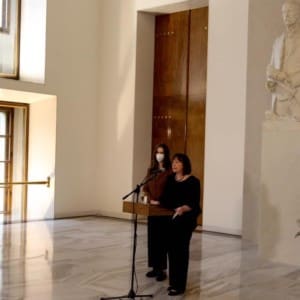The Wednesday attack by a deranged Muslim radical in the sleepy Norwegian town of Kongsberg has again brought home the dangers of Islamist ideologies circulating in Western societies.
On such a tragic occasion, one would expect opinion makers, journalists, and intellectuals to unite against religious fanaticism in support of the victims of such atrocities. Instead, virtually the entire Western media, left and what remains from what were once conservative publications, have used the incident to rally against right-wing, conservative, and national political movements. As if by a coordinated response, almost all of them drew parallels between the bow and arrow attack by a Muslim convert, in which five people have been killed, with the 2011 series of attacks by the extremist Anders Breivik.
The speed and coordination with which this association between the Utoya Island attacks and the events in Kongsberg have been published in the world’s press certainly do not help to alleviate conspiracy theories regarding the operations of modern Western media. From the American New York Times to the Washington Post, from the British Guardian to the French Le Monde, and of course the vast majority of German newspapers all over, all knew exactly what their task is even before the identity or motives of the attacker was known: to create a diversion from possible Islamist motives of the attack and channel them towards right-wing, nationalist movements, just as they wrongly did with the Utoya Island attacks. It is hardly credible to assume that almost all journalists globally make the same assumption, which is that the murderous rampage of “right-wing” Anders Breivik is somehow connected with the events in Kongsberg. It rather points to an information environment in which all major players understand the rules and expectations, in this case, the imperative to divert attention from the dangers of radical Islam infiltrating Western societies by associating guilt with nationalist, conservative politics.
No other publication shows the signs of this mentality more accurately than the once reputable, formerly conservative British newspaper, the Daily Telegraph. In their recent article entitled “How the Norway attack plays into the legacy of Anders Breivik: Rather than being repressed since the slaughter on the island of Utoya, populist, anti-migration parties have thrived,” they have become a case-study for false, ideologically distorted reporting that not only borders on an insult to human intelligence, but manipulates the memory of the victims of both Utoya Island and Kongsberg.
The British newspaper, whose former owner Conrad Black used to dine with Conservative Prime Minister Margaret Thatcher, has now joined the chorus of international terrorism apologists by publishing the article of author Richard Orange, who also freelances for the left-wing Observer newspaper. In this article, Orange implicitly associates Scandinavian conservative political parties such as the Danish People’s Party or the Sweden Democrats, that both campaign against uncontrolled mass immigration, with the motives of the mass murderer Anders Breivik, and uses this assumption as a matter of course and a departure for his entire argumentation. Never mind that there are literally no discernible parallels between the two attacks or attackers, apart from the fact that in both incidents people have lost their lives. Orange goes on a pseudo-intellectual rampage, in which he essentially argues that the “sporadic” Islamist attacks are making people draw the wrong conclusions about Islam. As to whether, once the frequency and spread of “sporadic” events reaches a tipping point, as is the case with terror attacks in Europe in the past five years, they should then rather be described as regular, the Telegraph’s columnist concludes that “It is hard to foresee exactly how these hardening Scandinavian attitudes towards Islam and migration will be affected by a suspected terror attack carried out by Muslim convert in Norway. But it is unlikely to make them any more positive.”
For any person with average intelligence and some semblance of a moral compass, it will remain a mystery as to why an incident in which a Muslim convert randomly shoots five innocent people with a bow and arrow would inspire people for a greater respect towards Islam. Either Islam has something to do with this incident, in which case it should be subject to well-founded criticism, or it does not – but then why make a positive association, either? Furthermore, the association of guilt between conservative parties such as the Danish People’s Party with the ideology that led Anders Breivik to murder dozens of children is just another tendentious fabrication that should not be repeated in any self-respecting media, either.
The Kongsberg incident had two fundamental components: the spread of a fundamentalist religious identity in Europe that inspires people to murder, and a broken justice system with a victim-perpetrator role-reversal. The killer was a convicted criminal, who should have been either behind bars or strictly supervised. He was also on the radar for his extremist religious views, the spread of which overburdend European security services are struggling to monitor. Thus, the moral of the incident is not a need for a fight against conservative parties, governments, or politicians, but the fact that another five people have lost their lives as a direct result of policy decisions by culturally and politically bankrupt governments propped up by Islamism apologist activist media.
It’s probably just a coincidence that the comment section underneath the Telegraph article has been muted.






